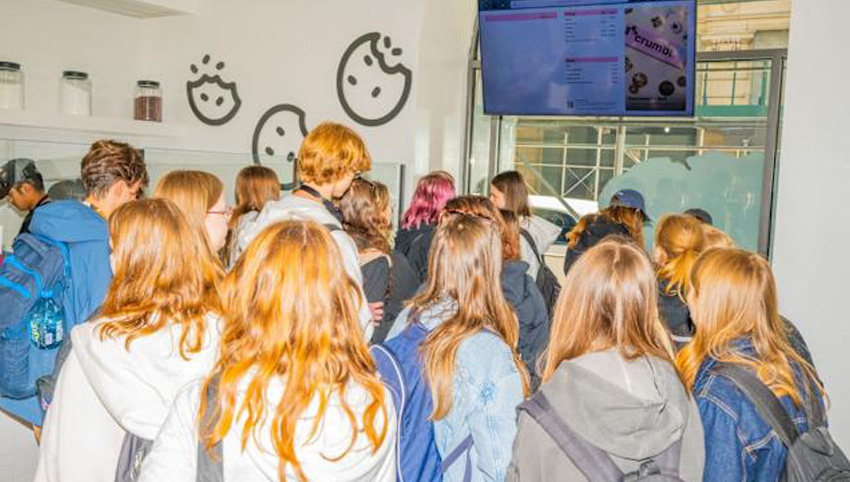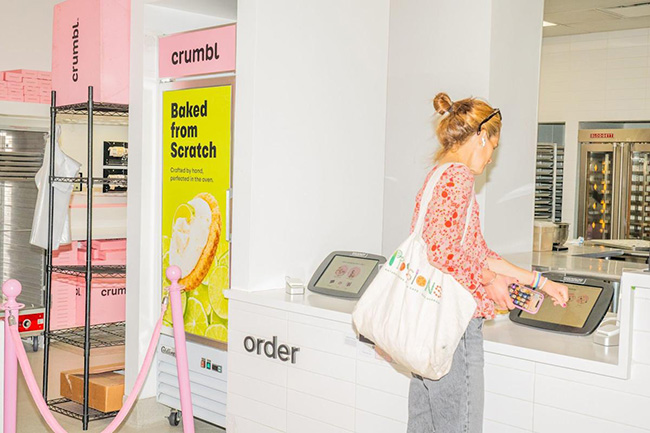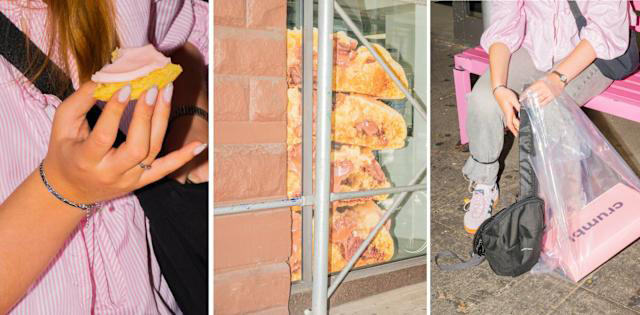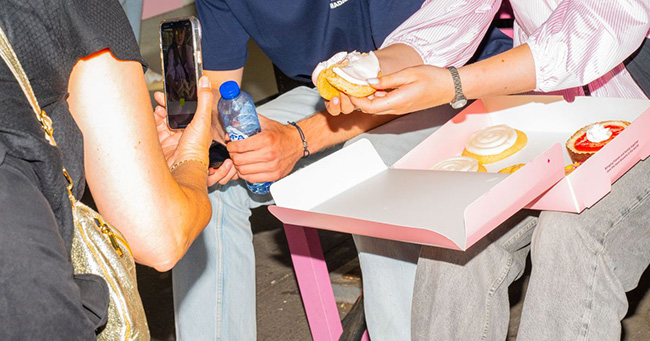Auto Added by WPeMatico

Crumbl has built its viral desserts into a big business, with franchisees operating over 1,100 stores in the US, Puerto Rico and Canada
by WILL KUBZANSKY
ON A recent afternoon on Manhattan’s Upper East Side, young patrons queued up for a TikTok-famous treat: A US$5 (RM21.30) cookie from Crumbl.
Just outside, Merle Behrens, 17, was posing for a photo with the chain’s signature pink box in hand. She purchased four of the brand’s giant — and very sweet — cookies: Chocolate cake, chocolate chip, cookie dough and blueberry cheesecake.
“Once you see it on social media, and also when you tell your friends or your family that you’re going to the US, everyone says, ‘Oh, you should get Crumbl cookies’,” said Behrens, who was visiting New York from Germany.
Crumbl has built its viral desserts into a big business, with franchisees operating over 1,100 stores in the US, Puerto Rico and Canada. Estimated sales of its brightly-coloured, oversized treats more than tripled from US$396 million in 2021 to over US$1.2 billion in 2024, according to food consultant Technomic. And as customers pull back on big-ticket items like cars or vacations, they’re likely to seek daily luxuries that are more affordable, said Aaron Allen, a restaurant consultant whose firm has worked with chains including Starbucks and The Cheesecake Factory.
“This is like, ‘I’ve busted my butt and I deserve a treat, I deserve a cookie’,” Allen said.

A customer punches in an order on a tablet at a Crumbl store in New York
Now, Wall Street is getting in. In May, private equity firm TSG Consumer Partners agreed to take a minority stake in Crumbl in exchange for preferred equity, while Blackstone Inc and Golub Capital have closed a US$500 million private credit loan to the company, according to a person with knowledge of the matter.
Crumbl confirmed that it sold a minority equity stake to TSG Consumer in a statement to Bloomberg News. “We are proud of what we’ve built and are excited about this new partnership with TSG, which will help support our continued growth and long-term vision,” a company spokesperson said.
TSG Consumer and Blackstone declined to comment. Golub Capital did not respond to a request for comment.
The interest in Crumbl is just the latest example in a string of deals looking to capitalise on America’s sweet treat economy. Last week, Krispy Kreme Inc announced it had sold off its remaining stake in Insomnia Cookies to two private-equity firms — after selling a majority stake last summer at a US$350 million valuation. That came on the heels of New York’s Chip City Cookies bringing in a second round of investment from Enlightened Hospitality Investments, a fund led by Shake Shack Inc founder Danny Meyer.
Crumbl’s business is a franchise model, where the company takes 8% of gross sales at locations, in addition to fees for training and marketing.
Each week, the brand unveils a fresh batch of treats to its over 16 million followers on TikTok and Instagram, complete with cinematic footage of the desserts on offer. Its emphasis on scarcity works to drive customers into the white-walled, open-concept bakeries week after week. “This is your last chance to get this week’s lineup,” an employee warns in one clip, highlighting her picks: A Banana Cream Pie cookie and a “classic semi-sweet”.
An ecosystem of fan-made content exists in parallel.
On TikTok, customers post unboxings, showing off each item to the camera before biting in. On Reddit, devotees campaign for their favourite flavours like “Mallow Sandwich Cookie” or “Caramel Toffee Butter Cake” to garner votes at their local stores. (Rewards members who spend over US$50 annually can vote on Crumbl’s app for items to be added to their local franchise as a one-day special.)
These contests have spurred an unofficial barter system on social media, in which fans trade votes across locations to boost their preferred flavour. One fan active on the r/ CrumblCookies Reddit forum this month pleaded:
“Please please please can you guys vote for nilla bean cupcake or chocolate covered strawberry at West Brighton location? the first place is s’mores cookie BUT WE’RE GETTING THAT NEXT WEEK!!! i have 4 votes left,” to which another replied,
“If you can vote for double fudge brownie in Dalton, Ga I’ll vote for yours!”

(From left) A customer with a classic pink sugar cookie, the window of a New York Crumbl and a to-go bag with a pink Crumbl box inside
By putting out fresh flavours so regularly, Crumbl has given itself a leg up, said Clifford Hudson, former CEO of Sonic Corp and the founder and director of DIA Equity Partners. “It’s a more extreme position than what we used to think of as new product news,” he said. “They’re taking it to a different level.”
Crumbl began in Utah, the project of Jason McGowan and Sawyer Hemsley, co-founders and cousins. The pair opened their first store in Logan, Utah, in 2017. By 2022, there were 691 locations around the US. The business’s growth has generated standout paper gains for its co-founders. Based on an analysis of the company’s financials and the trading multiples of publicly traded peers, Hemsley and McGowan’s founding stakes were worth close to US$400 million each before the TSG deal, according to the Bloomberg Billionaires Index.
A Crumbl spokesperson confirmed the pair previously owned the company outright, and said McGowan had been the sole capital provider.
Crumbl finished 2024 with earnings before interest, taxes, depreciation and amortisation of about US$91 million, according to calculations based on a firm disclosure. The company declined to comment further on its finances.
“I would be surprised if there’s not a pretty good margin in a US$5 cookie,” said DIA Equity Partners’ Hudson, who has no affiliation with the company or its franchisees.

A customer holding a Crumbl cookie to a cell phone camera
Investor interest in Crumbl comes at an otherwise tricky time for sweets. By volume, sales of “better-for-you” snacks ticked up in 2024, while more indulgent categories all declined, according to market research firm Circana. And weight-loss drugs like Ozempic and Zepbound are proliferating further — while the federal government scrutinises synthetic food dyes common in treats, including some of Crumbl’s desserts.
But Americans tend to eat healthier at home and look for indulgences when they go out, said David Portalatin, senior VP and industry advisor for food and foodservice at Circana. That was visible in quick-service restaurant traffic in the first quarter: Overall, the sector saw less traffic than it did the year before, Portalatin said. But visits for “snack occasions” in the afternoon and evening were up.
And while Gen Z is more focused on protein and “functional beverages” than other generations, 28% of their restaurant visits are for snacks, Portalatin said. That’s a higher proportion than all other consumers.
“Some occasions treat my physical well-being, others treat my mental and emotional well-being and they’re viewed as being part of the same overall goal,” Portalatin said.
A business like Crumbl also offers a degree of certainty around an exit strategy, as opposed to businesses that face more volatility, said Donna Hitscherich, co-director of Columbia Business School’s Private Equity Programme. The owners of the cookie brand were previously said to be exploring a sale that would value the company at nearly US$2 billion, Reuters reported in January.
“At the end of the day, people like their cookies,” she said. — Bloomberg
- This article first appeared in The Malaysian Reserve weekly print edition
The post Wall Street wants in on Crumbl’s oversized sugary cookies appeared first on The Malaysian Reserve.
